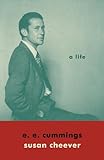|
Today's selection
- from E.E. Cummings: A Life by Susan Cheever. The poet E.E.
Cummings was part of a literary movement known as Modernism, along with an
illustrious group of artists including James Joyce, Henri Matisse and Pablo
Picasso:
"Primarily
remembered these days for its funky punctuation, [E.E.] Cummings's work was
in fact a wildly ambitious attempt at creating a new way of seeing the world
through language. Part of a powerful group of writers and artists, many of
whom were Cummings's friends -- James Joyce, Gertrude Stein, Hart Crane, Marianne
Moore, Ezra Pound, Marcel Ducharnp, Pablo Picasso, Henri Matisse -- he
struggled to reshape the triangle between the reader, the writer, and the
subject of the poem, novel, or painting. As early as his 1915 Harvard College
graduation valedictorian speech, Cummings told his audience that 'the New
Art, maligned though it may be by fakirs and fanatics, will appear in its
essential spirit ... as a courageous and genuine exploration of untrodden
ways.'
"Modernism as Cummings and his mid-twentieth-century colleagues embraced it had three parts. The first was the exploration of using sounds instead of meanings to connect words to the reader's feelings. The second was the idea of stripping away all unnecessary things to bring attention to form and structure: the formerly hidden skeleton of a work would now be exuberantly visible. The third facet of modernism was an embrace of adversity. In a world seduced by easy understanding, the modernists believed that difficulty enhanced the pleasures of reading. In a Cummings poem the reader must often pick his way toward comprehension, which comes, when it does, in a burst of delight and recognition. Like many of his fellow modernists (there were those who walked out of Stravinsky's Rite of Spring, and viewers were scandalized by Marcel Duchamp's Nude Descending a Staircase), Cummings was sometimes reviled by the fakirs and fanatics of the critical establishment. Princeton poet Richard P. Blackmur said Cummings's poems were 'baby talk,' and poetry arbiter Helen Vendler called them repellent and foolish: 'What is wrong with a man who writes this?' she asked.
"Nothing
was wrong with Cummings -- or Duchamp or Stravinsky or Joyce, for that
matter. All were trying to slow down the seemingly inexorable rush of the
world, to force people to notice their own lives. In the twenty-first
century, that rush has now reached Force Five; we are all inundated with
information and given no time to wonder what it means or where it came from.
Access without understanding and facts without context have become our daily
diet.
Although in the 1950s and '60s Cummings was one of the most popular poets in America, he sometimes didn't make enough money to pay the rent on the ramshackle apartment in Greenwich Village on Patchin Place where he lived with the incandescently beautiful model Marion Morehouse. This bothered Cummings not at all. He was delighted by almost everything in life except for the institutions and formal rules that he believed sought to deaden feelings. 'Guilt is the cause of more disauder/than history's most obscene marorders,' Cummings wrote. "Cummings was an American aristocrat with two degrees from Harvard; my father had been headed for Harvard when he was expelled from high school, and he adored Cummings's combination of academic success and lighthearted lack of reverence for academic success. In spite of his establishment background, Cummings treated the establishment with an amused contempt. "At a time when The New Yorker annoyingly bowdlerized ... mentions of kissing, Cummings got away with writing graphic erotic poetry, neatly stepping around the Mrs. Grundys of the magazine world. 'may i feel said he / (i'll squeal said she / just once said he),' he wrote, in a famous poem that doesn't upset the apple cart as much as give it a new team of wild horses. He also wrote some of the sweetest love poems of the century:
i carry your heart with me(i
carry it in
my heart)i am never without
it(anywhere
i go you go,my dear; and
whatever is done
by only me is your doing,my
darling)
 E. E. Cummings: A Life E. E. Cummings: A Life
Susan Cheever
Pantheon Books a division of
Random House
Copyright 2014 by Susan Cheever
Pages xi-xiii
Delanceyplace is a brief
daily email with an excerpt or quote we view as interesting or noteworthy,
offered with commentary to provide context. There is no theme, except
that most excerpts will come from a non-fiction work, mainly works of history,
are occasionally controversial, and we hope will have a more universal
relevance than simply the subject of the book from which they came.
To visit our homepage or sign up for our daily email click here To view previous daily emails click here. To sign up for our daily email click here. |
Former leading New Zealand publisher and bookseller, and widely experienced judge of both the Commonwealth Writers Prize and the Montana New Zealand Book Awards, talks about what he is currently reading, what impresses him and what doesn't, along with chat about the international English language book scene, and links to sites of interest to booklovers.
Wednesday, January 14, 2015
E.E. Cummings: A Life
Subscribe to:
Post Comments (Atom)


No comments:
Post a Comment